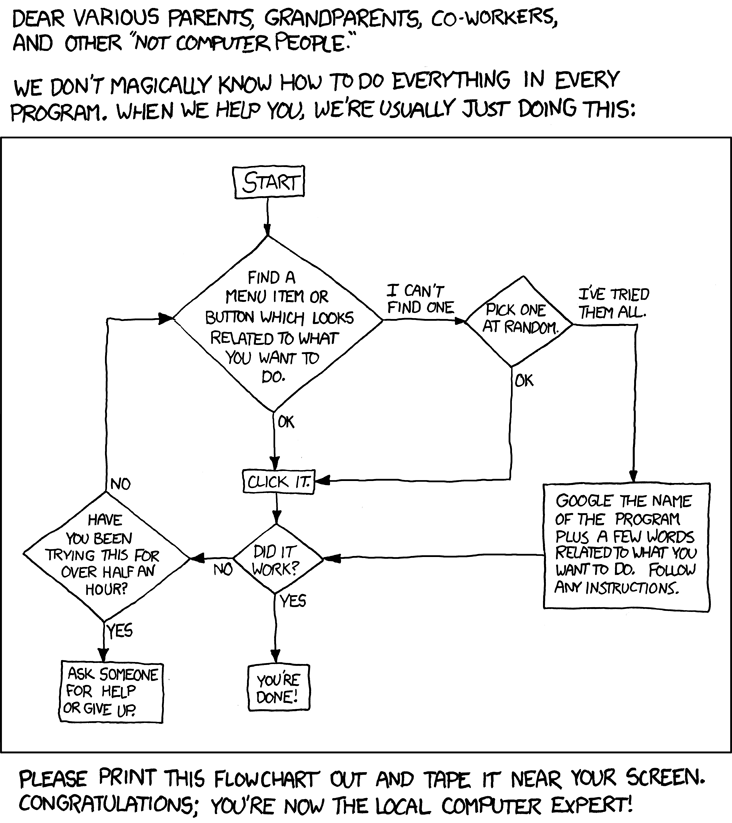
Funny, right? Har har har. But it's worth thinking about why some people (generally younger, generally more immersed, more regularly, in new media technologies) feel comfortable tooling around in a vaguely solution-oriented sense, while other people (generally older, generally less immersed, less regularly, in same technologies) see their computers, cellphones, and other tools as impenetrable black boxes whose functions exist in a mysterious, perhaps dangerous ether.
This morning I had the awesome experience of hearing educational researcher and recently minted Indiana University Ph.D. Tyler Dodge talk about his research into new media, visual realism and empathy. He presented a version of the following diagram (which I have helpfully built upon with a small set of descriptors). The basic idea is that new media can be designed along two distinct continua: interactivity and immersion. Put briefly, Tyler argued that high interactivity + high immersion = awesomeness.

Tyler added that high interactivity with low immersion leads to frustration. It's what I feel when I work with the visual programming language Scratch; it's what other people feel when they look at the Twitter interface; it's what still others feel when faced with this:

I know doing something will make something happen, we think in the various contexts that make us feel like a fish gaping in an empty bucket, but what am I supposed to do? And what will happen when I do it? What will happen if I do it wrong?
I know the feeling. I know it, though computer- and internet-based troubleshooting doesn't trigger it in me--yet. My day will come, I suppose. Oh yes, it will come. So too much hubris now probably doesn't pay.






4 comments:
To be fair, the descriptors of frustration and boredom with regards to disproportionate affordances of interactivity and immersion, respectively, does not reflect my own work but that of Douglas and Hargadon (2000), building on the work of Csikszentmihalyi (1990) and others. I find the characterization – and your elaboration – to be useful, though with conditions, of course, on its application.
My own work concerning interactivity and immersion as orthogonal variables suggests that they may instead serve to describe various traditional media user roles, including author, performer, audience, and player. My model of user roles and the design decisions that might serve to foster them remains, at present, separate and distinct from the model developed by Douglas and Hargadon.
If you are interested in their model, though their Hypertext 2000 paper is no longer posted where I found it, you might consult one of several later publications presenting it, such as the one below. And thank you for your enthusiasm,
from, Tyler D.
Douglas, J. Y., & Hargadon, A. (2001). The pleasures of immersion: Schemas, scripts and the fifth business. Digital Creativity, 12(3), 153-166.
I started as a computer programmer and was ahead in my field during my early days of college. While others felt that the computer was a super-smart-brain with all of the answers, I carried stacks of hole-punched cards to run a simple 150 line program that had to run overnight. These were the pre-internet days when the memory in a room-sized computer had less memory than today's calculators.
The first time I sat before a computer on the internet and got the message, "Illegal command." was petrifying...were the police going to show up at school and arrest me? What had I done to screw up the entire internet system?
So much has changed since then. I tried to keep up for awhile, but technology moves faster than Superman. I'm no longer ahead of the game and am running to keep from falling further behind. This is the case for those parents who fear messing with the computer too much. The computer seems super-human.
I know that phishers and scammers may steal my identity and that Homeland Security may come to take away my computer because someone stole something through my unprotected wireless signal. Now I wonder, is that an "illegal command?"
what a great post. thank you so much for sharing that chart.
i think we should pay more attention to friendly entries - for those not so inclined to immerse.
thank you dear.
Nancy's illegal command story cracked me up. I know I'm a horrible person, but that's so adorable.
I'm curious as to why Scratch was high interactivity yet low immersion for you. Is it because it's not responding to you in the way you want? What is it about it that makes you go "RAWR"? I think it's just as important for us to note why we don't learn as much as why we learn.
Post a Comment